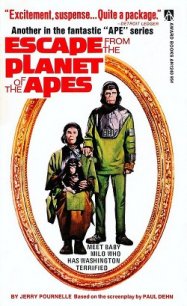Conquest of the Planet of the Apes - Jakes John (читать книги онлайн полностью txt) 📗
A brutally powerful jet of water spouted from the first hose, the second, the third. The water stunned and panicked the attacking apes, knocking them off the turrets, spilling them among the bodies of the blood-slimed pavement. Ape yells of terror racketed between the buildings. The apes who shrieked loudest were those carrying police shields that the streams of water pounded thunderously.
Directly below Caesar, a second vehicle brought its hoses into play. Six powerful streams, angled in from both sides of the street, began to wreak havoc in the ape ranks, battering the animals back, sending them retreating a few steps, then more . . .
In seconds, the strategic balance shifted. Perhaps the human commander knew what he was doing after all. Why slaughter his own when the huge hoses, each requiring half a dozen men to hold it, seemed to be doing an effective job?
Something must be done to nullify the power of the hoses. That responsibility was Caesar’s.
The walkway he’d mounted continued down, reaching the street at a point some yards to the rear of the parked vehicles. Caesar raced down the incline, broke into the open, and ran full speed away from the conflict. He’d taken no more than four long strides when one of the vehicle turrets began to chatter. Slugs chewed the pavement behind him.
Cursing his bad luck in being spotted, he ducked low, angled toward the wall of a building. The relentless bullet-pattern followed him. Zigging and zagging wildly, he dove head first into the opening of a street as high-powered bullets ripped chunks from the corner of the building.
Behind him, the gun chattered away to silence. Panting, he crept back to the corner, risked a glance out and to the right.
Beyond the armored vehicles, great plumes of water caught the light. The roar of the hoses blended with the shrieks of the terrified apes. They were retreating . . .
He couldn’t possibly take out the two hose vehicles alone. The situation looked hopeless—until he heard a soft gibber from across the boulevard.
Urgently waving for his attention from the opposite corner was one of the groups dispatched to the tunnels with orders to come up near the Civic Center. Caesar almost yelped with joy.
He counted seven apes, including pistol-armed gorillas—and the busboy brandishing his cleaver.
He’d found his commando force. Now if he could only utilize them in time . . .
Caesar drew in one quick breath, ran across the boulevard. No devastating blasts came from the armored turrets. Evidently the gunner who’d fired on him had turned his attention elsewhere, convinced he’d driven the lone ape into hiding—or killed him.
Caesar skidded to a stop in front of the group, rapidly issued orders in a combination of words and gutturals. Then he slipped down along the buildings fronting the boulevard, followed by the other apes.
They came howling up over the top of the vehicle at the left of the street, dropping among the hose-handlers before they were detected. An astonished policeman near the adjacent vehicle aimed his pistol at the attacking group—and took a bullet in the center of his forehead. One of Caesar’s gorillas grunted pleasurably and waved his smoking gun.
Men holding the hoses stumbled, struck from behind. Gorillas fired—not with great accuracy, but at close range, accuracy didn’t matter. As the men fell, Caesar pantomimed to the busboy. He cut through one hose, then the others, with swift efficient slashes of his cleaver.
Water flooded around Caesar’s feet, making footing treacherous. But the intimidating power of the hoses had been eliminated from this side of the street.
Yelling, Caesar jumped up and down to attract the attention of apes who had retreated.
A quick assessment showed many humans lying dead in the boulevard—and a smaller number of apes. But Caesar’s yelling had attracted the desired attention. Halfway down the block, the apes who had fled from the hoses on this side of the street saw that they were no longer threatened. They regrouped and came forward in a body as Caesar jumped to the hood of the hose vehicle.
A nearby turret revolved to aim its muzzle at him. The turret chattered—but Caesar was already gone into the darkness.
The busboy joined him, and, momentarily, more apes, clambering up and over the now useless hose car. Caesar and his little band had successfullly opened a path. Renewed howling from ape throats signaled the realization of this success.
A few blocks further on, Caesar glimpsed the place where the boulevard opened into the plaza at Civic Center. If they could only gain entrance to the Command Post, Caesar knew he could use the equipment to confuse and demoralize the city’s defenders even further. To judge from the firelight down nearly every street, the humans were waging battles against rebelling apes almost everywhere.
To the rear, the turrets swiveled again. Chattering guns began to mow down sizeable numbers of apes who had broken through Caesar’s hard-won avenue. Trying to shut out the sound of animal screaming, he kept on, running for the objective that loomed clearly ahead.
In the Command Post, all pretense of order was gone. Every monitor showed a picture of citywide carnage. Panic had set in. Even here the apes on duty in the dim underground chamber were growing restless. Some turned on their masters.
One of Breck’s assistants arrived in a rush: “Governor, we think a small group of them has gotten past the armored cordon. We could be under direct attack very soon.”
Jason Breck felt sick; weak in the legs. On every hand, screens and amplifiers brought reports of destruction. Apes rising, entering private apartments, butchering, burning. The calls for assistance had multiplied so fast that Breck knew all the human forces at his disposal could never answer even a fraction of them.
He asked, “How many police can we deploy from here?”
“Thirty or forty,” said the assistant.
“Send them up to the plaza. With gas. Order them to put down a screen immediately. As soon as the men are outside, seal the doors.”
“But that means they can’t get back in if—” MacDonald began.
“I know exactly what it means,” Breck cut him off. “Do it.”
The assistant disappeared in the light-flecked gloom. Within moments, a ghostly file of policemen hastily donning gas masks could be seen disappearing up the stairs. Breck listened to the last of their booted feet hammering away on the concrete steps. A moment later he let out a long breath, soothed by the grinding of the machinery that was shutting the maximum-security doors at the landing half way up.
He jerked his gaze back to the monitor covering the plaza, saw the police with their large-muzzled gas-firing rifles deploying. The lenses of their masks shone like huge, eerie eyes.
MacDonald was so tired he wished his mind would blank out. But he gestured to another flickering monitor, trying to offer what little hope he could.
“The shooting seems to have died down near the armor line, sir.”
“Because they’ve broken through!”
“Maybe they’ve been turned back.”
“No,” Breck said in an empty voice. “No. They’re coming to kill us all.”
Half a block from the point at which the boulevard opened onto the broad expanse of the Civic Center Plaza, Caesar held up his hand.
About a hundred apes had broken through where the hoses were put out of action. Now they snuffled and snorted, restlessly awaiting his sign to move forward again.
But policemen were deploying in the plaza. Lights flashed from the eyes of strange masks they wore over their faces. They carried what appeared to be rifles, but with unusually large, cylindrical devices lengthening the muzzles.
The police formed a double rank facing directly toward the boulevard. Apprehensively, Caesar called for the advance to resume. A moment later, he understood the function of those peculiar weapons.



